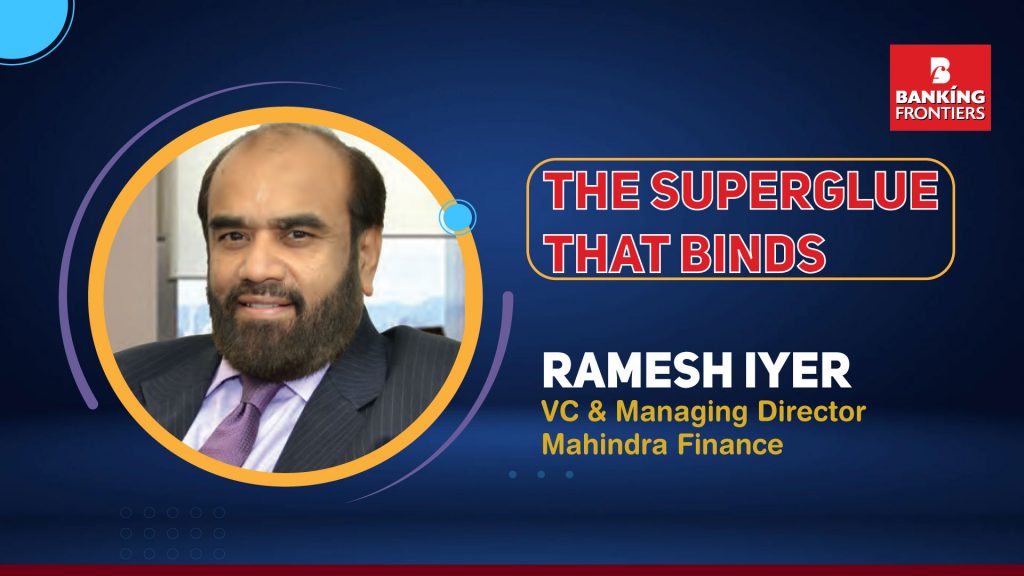If a man leads an organization for over 30 years and takes it from a fledgling to an industry giant, then undoubtedly, he’s more than a CEO, He is a leader. Ramesh Iyer, VC & MD, is the unstoppable driver at Mahindra Finance, and the fuel of his choice is ‘Culture’, which he has defined and refined to achieve his vision. Banking Frontiers explores what he thinks about culture and how he practices it:

The way an organization scouts, screens, and recruits people is surely a defining characteristic of the organization’s DNA. So how does Mahindra Finance do this, and why?
Ramesh Iyer says that when a new joinee is to be inducted, the first and foremost parameter to be kept in mind is the overall cultural fit. The culture at Mahindra Finance is one of respect, being friendly, and have an emotional connect among the employees. The company does not look for task masters who are professionals in a robotic sort of way, and have nothing to do with people. A leader of this kind will create a large battalion of people under him, who are not engaged.
Ramesh delves deeper into the organization culture at Mahindra Finance: “We are not a hierarchical organization. So, we have an open culture where anyone can speak with anybody, irrespective of their position within the organization. The second aspect of culture is that we are very respectful and mindful of people as human beings. Whatever be your standing in the company, we respect your standing. So therefore, when we hire somebody, we want someone who should have the feel for people. Like you use technology and you use data, you should be connected with people.”
The question then naturally arises whether this culture favors extroverts over introverts?
Ramesh acknowledges that extroverts have an ability to reach out to people but believes that introverts start feeling very comfortable about it over a period of time, because they see people are reaching out them as well.
What then are the culturally difficult things to maintain in an organization?
Ramesh thinks that if someone is very hierarchical minded, it’s very difficult for that person to survive in his organization, because when people go to anybody and get things done, it will make the person feel irrelevant. The second challenge Ramesh sees is that even if a person is good and transparent, it is not necessarily people below are very mature and transparent. So, some of them take an undue advantage of this and hence one has to be very mindful of this approach as well.
Ramesh also emphasizes being upfront about bad news. If someone has done a mistake, or has lost money, he/she should be the first to bring it to the attention of the management, and therefore this calls for a fearless culture. The whole organization including all managers should have the maturity to listen to any bad news. If you create a culture of authoritative fear, then such news gets suppressed, and when it comes out with a burst, can become a crisis.
Ramesh strongly believes that people should always fear the manager for their knowledge and not for their authority. If it is the latter, then people will learn to act in a pleasing manner rather than come prepared.
Building trust is another critical aspect of the organization culture. Ramesh believes that a person is a leader when people start sharing the personal issues and agendas and problems with the leader, which is an indication of trust. “Till such time, they are only discussing their official problem with me, I’m still a manager. From manager to becoming a leader, that trust has to get built with each employee and that measurement of trust is when they are even willing to confine their personal issues with you,” explains Ramesh.
BIGGEST SATISFACTION
Ramesh’s biggest satisfaction over the years is about the many, many people who joined Mahindra Finance at a very junior level in the organization in the early days. He has been able to mentor them, coach them and guide them to build their confidence and so many of them today have become business heads. Ramesh gives an example: “One such person is Dinesh Prajapti. He joined the company 24 years back in internal audit, from where he moved to accounts, and then to corporate affairs and today he is Treasury Head, a very critical position in an NBFC.”
BIGGEST DIS-SATISFACTION
Ramesh narrates: “What does not give me satisfaction or what sometimes kind of shakes me up, is that in our early days, we had a very senior person heading the business and we had only a small steering committee. As we started adding new businesses and people, I probably could not give him adequate personal attention and time. The person probably started feeling a little insecure about it which caused a change in his behaviour. In such matters, counselling is so important which we did try for almost a year, post which we had to part ways. Honestly, I still feel bad about this issue and am regretting for how somebody got into such a situation.”
TOWARDS MENTAL HEALTH
What is the antidote to stress arising at the workplace?
“The only thing I keep telling everybody and which I do it myself all the time, is to have one hobby. Whatever be that hobby – reading writing, dancing, singing, bowling, – but you must have one, so that beyond 5:30 pm you pursue. If you do that, you will never become imbalanced,” advises Ramesh.
So, the natural question is, what is Ramesh’s hobby? “So, my hobby is singing, I do a lot of singing. In fact, I’m a part of a small bhajan group where I go on weekends to some temple or some function as a group. Also, I have recorded some 1300 songs for my own satisfaction, all of which I have done while moving around in my car.”
So these are the multiple dimensions of culture that Ramesh Iyer sees and practices as he builds his organization as a closely-knit family.
__________________
Read more:







